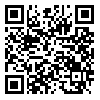BibTeX | RIS | EndNote | Medlars | ProCite | Reference Manager | RefWorks
Send citation to:
URL: http://ioh.iums.ac.ir/article-1-1979-en.html
Background and aims: Emotional divorce is one of the major threats to family breakdown, so it is important to understanding the factors influencing it. Present research aimed to predicting emotional divorce based on variety seeking, negative perfectionism and insecure attachment among employed women.
Methods: This was a descriptive study from type of correlation. The population included all employed married women in governmental offices of Urmia city in 2015 year. Totally 267 person were selected through multistep cluster sampling method and completed the questionnaires of emotional divorce, variety seeking, negative perfectionism and insecure attachment. Data was analyzed with using of SPSS-19 software and by Pearson correlation and multivariate regression with stepwise.
Results: Finding showed a positive and significant relation between variety seeking (r=0/44), negative perfectionism (r=0/36) and insecure attachment (r=0/18) with emotional divorce of employed women. Also the variables of variety seeking, negative perfectionism and insecure attachment significantly can predict 33/6 percent of variance of emotional divorce among employed women (p<0/01).
Conclusion: The results indicated the importance of the variables of variety seeking, negative perfectionism and insecure attachment in predicting the emotional divorce of employed women. Therefore to planning for the prevention of emotional divorce, especially in employed women should be considered the role of mentioned variables.
Received: 2017/01/9 | Accepted: 2018/03/3 | Published: 2018/07/11
| Rights and permissions | |
 |
This work is licensed under a Creative Commons Attribution-NonCommercial 4.0 International License. |






